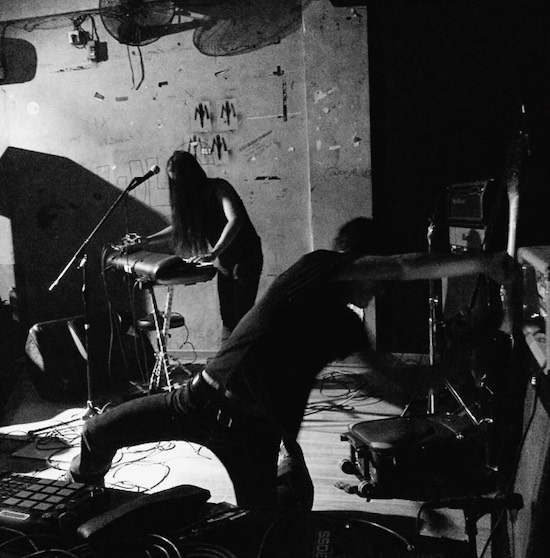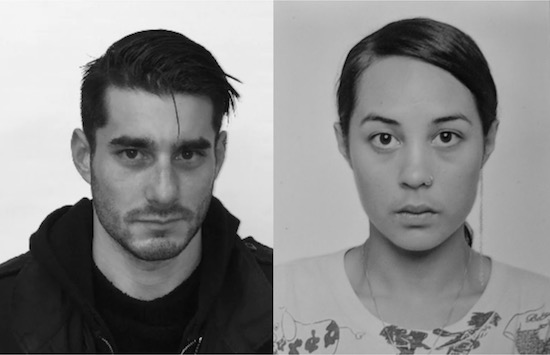If there’s an issue with contemporary serious electronic noisy music it’s that it all-too-often lacks a sense of drama or theatre. It’s all very well to throw around references to supposedly transgressive philosophers and artists, but if your music just sounds like identikit, slightly academic expensive static, what’s the point, really? Kathleen Malay and Jason Kudo of Ora Iso, on the other hand, make music that’s steeped in twisted wrongness and awkward desperation.
Their sound is dense yet heavily lo-fi, scuzzy and morbid, yet because there are actual strangled cat pop songs at the heart of excellent debut album Image Certifies there’s a decent emotional heft to it all. Throughout, clanking piano and Kathleen Malay’s vocals are shrouded in grouching fuzz as they’re kicked by dense rhythmic thuds. The music from this duo, signed to Karl ‘Regis’ O’Connor’s Downwards label, will, like a wimple of nuns who’ve supped with Satan and turned into a coven, rather suit the cavernous interior of the Berlin power station that hosts the annual Atonal Festival in a couple of weeks.
‘Deep Fix’ is a strung-out, noisy creature that prowls somewhere between early PJ Harvey and great Australian group HTRK; ‘Keep Your Boot’ on a lament sung round a campfire in an echoing, ruined factory out on the snowbound steppe. There are wonderful, fragmentary tracks too – ‘Skipped And Completed’ a song from a hellish bar where the Birthday Party have just spent too long in the loo; the downtempo whine and disgusting electronics of ‘Have I Gone To Far’ like failing at spitting out something worse than regret. Their version of Chris Isaak’s ‘Wicked Game’ is the Mr Hyde to The xx’ slick and ordered Dr Jekyll.
We have the video to ‘Deep Fix’ for you below this explanation of what the track is all about, and after that a full interview with the duo. "’Deep Fix’ is about a world fallen sick, with all its inhabitants fallen prey to an endless range of obsessions. The film itself is about exploring one’s psyche, digging through the grey area between feeling haunted and mental trickery. While directing this film, there was a strong air of mysticism emanating from the red stone that appears.
"I tried to connect with the spirit trapped in that red stone, they reached out once but subsequently left again. Searching for the stone equates to searching for something that can’t be touched, just as if to rummage in the darkest corners of one’s mind. The landscapes are intentionally empty and devoid of other characters to emphasize an illusory feeling, I’m the only ‘real’ thing, but also portrayed as unstable in this imaginary environment, as if to second-guess the self as a mirage. The world is all but a dreamscape, something at the tangent between trying to pierce through a wall and being stuck inside, of all things, a red stone."
What was it that first impressed you about each other when you first met? What made you want to collaborate?
Jason Kudo: For me it was Kat’s enthusiasm and the fact that she wasn’t totally jaded yet.
Kathleen Malay: Jason owned a Wurlitzer electric piano and I really wanted to play it.
What does Ora Iso stand for or mean?
KM: In the Javanese dialect, Ora Iso translates to “can not.”
How did the connection with Downwards come about? Is it a label you’ve been inspired by for a while?
JK: I meet Karl through my roommate Jim. Downwards is an incredible label but the thing that made me want to work with/for Karl was his dark sense of humour. Connecting with someone on that level means more to me then any resume.
What was the first music you loved and how does it relate to the sound of Ora Iso now?
JK: The first music I completely fell in love with as a kid was metal, which I’d say has little to nothing to do with Ora Iso or any of the bands I’ve been in. I still love it though. I went to see Slayer multiple times in high school and still have my vintage Slayer shirt I got from an older metalhead friend. I used to wear it all the time as a teen, and caught a girlfriend trying to steal it once. We’re not together anymore.
KM: My very first memory of music was the piano teacher who would come to my childhood home in Jakarta. I don’t remember his face or his name, but I can remember myself at five-years-old twirling around on the tiles to the classical pieces he played, while waiting for my turn to practice. I always liked nocturnes the most, and maybe that carried over into Ora Iso, music suggestive of the night.
Kathleen, how does your Australian/Indonesian heritage feed into Ora Iso’s music?
KM: I have no Australian blood, I just grew up there for reasons I don’t fully understand and never will because the one who knows has passed away. I wish I was more Indonesian than I feel. I’m half-American but only ended up living there from 2011 to 2016 through circumstance. An incohesive identity, or not feeling as if there’s a place to call home sometimes troubles me. I often forget that I’m actually very lucky to have lived between different cultures. Usually, the things that bother me end up finding their expression in music.
Can you tell us a little about how your music comes together? Are you in the same place or is there a geographic distance?
JK: The process usually starts with me just collecting samples, mostly just foreign objects, while others are instruments I made for other bands I was in. Once I’ve compiled the sounds I want to work with into the MPC I make a series of rhythm tracks that can be edited on the fly. Usually we just jam on those live until they develop into songs. Occasionally one of us will come to practice with an idea already in mind. For example Kat had the piano part for ‘Digital Crutch’ already worked out and I composed the samples and guitars around that. For ‘Keep Your Boots On’ I come up with the samples and guitar simultaneously and showed Kat the parts already arranged. This is kind of rare for us but might be the only way we can keep working together given that we live in different places now.
KM: Since being apart, Jason has emailed me some tracks to fill in, but I never responded to him. Let me do that now… Dear Jason: I’d much prefer to wait until we’re in the same studio again. You and I will have a very long conversation first, filling in the gaps of the last two years, and after that we shall play and find out what our latest catharsis sounds like.
Your record is described as "a love letter to a society dying of its own self-induced cancers". Why a love letter rather than a despairing letter of rage?
JK: Because rage is easy… and boring. Besides anyone with a basic level of self-awareness has to realize that they’re part of that society and helped create that cancer. How can I be angry at something I helped to make?
KM: I’d rather let readers interpret that phrase for themselves.
What are the worst of the self-induced cancers you mention?
JK: It’s a tough question. I would say it’s probably what I call the entitlement syndrome. Everybody seems to be waiting for some higher authority to come and save them and until they come, all the troubles in the world are that mystical (if not fictional) higher authority’s fault. No one’s coming to save you. If you want to save yourself start by saving the person next to you.
KM: Control & greed.

How does the Ora Iso live show develop from the record?
OI: It’s more as if our live shows serve as a blueprint for making records, and it’s also a way for us to work out new material. There’s a rather straight line drawn between recording and performing, we like to keep it simple. No special lights, no visuals, just our bodies and our instruments.
Have you been to Atonal before?
KM: I wasn’t aware that such a festival existed, so when the invitation came and I researched it, I was humbled and a bit stunned at the chance to participate.
What are your tactics for filling such a cavernous space?
OI: Our approach is more a feeling of challenge rather than a specific tactic. Regardless of venue, performing for us has always been a type of catharsis, a way to purge, and our format will never stray from that.
Ora Iso play this year’s Berlin Atonal, which features the likes of British Murder Boys, Helena Hauff, Objekt, Actress and everyone brilliant, basically – for more information visit the Atonal website



